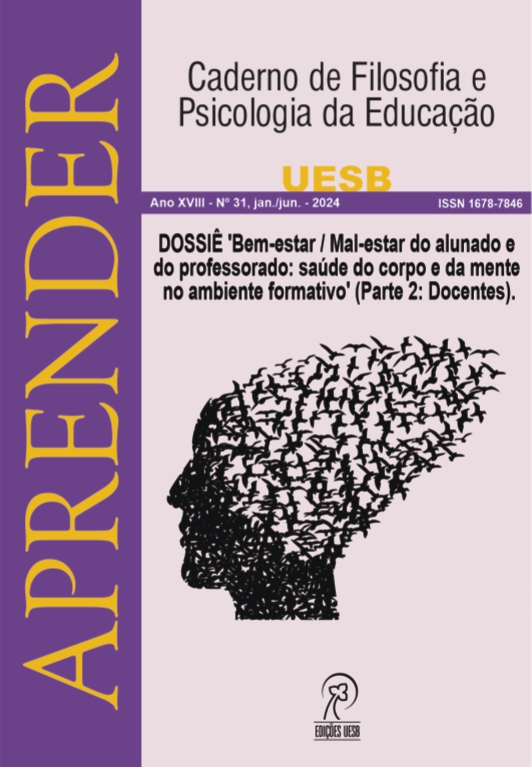Teacher well-being and affection between teacher/student: perception of interns in the early years of Elementary School
DOI:
https://doi.org/10.22481/aprender.i31.13718Keywords:
Affectivity, Teacher well-being, Supervised internshipAbstract
This work deals with the importance of affection between teachers and students for teacher well-being. It aims to understand the perception of five interns from the Pedagogy Course on the relationship between teachers and students observed in the mandatory Supervised Internship in the initial years of Elementary School. The methodology was carried out through analysis of the final reports, to understand the perceptions of these interns in the observations carried out in municipal schools in the city of Maracaju/MS. We found that teachers, to understand their emotional state, need to learn to evaluate and work with their own emotions and the emotions of their students and colleagues. Affection between teachers and students is essential for both teachers and students to develop well-being factors. In this sense, teachers who deny affection, viewing it as unprofessional, only increase tensions and conflicts in the classroom, transforming it into a hostile and unwelcoming space.
Downloads
References
CODO, W. (Coord.). Educação: carinho e trabalho. 4ª.ed. Petrópolis, RJ: Vozes, 1999.
DAMÁSIO, A. O mistério da consciência, do corpo e das emoções ao conhecimento de si. São Paulo: Companhia das Letras, 2000.
ESTEVE, J.M. O mal-estar docente: a sala de aula e a saúde dos professores. Tradução de Durley de Carvalho Cavicchia, Bauru/SP: EDUSC, 1999.
FLORES, M.A. algumas reflexões em torno da formação inicial de professores. Educação, Porto Alegre, v. 33, n. 3, p. 182-188, set./dez. 2010.
HARGREAVES, A. O Ensino na Sociedade do Conhecimento: a educação na era da insegurança. Colecção Currículo, Políticas e Práticas. Porto: Porto Editora, 2003.
JESUS, S. N. Bem-estar dos professores: estratégias para realização e desenvolvimento profissional. Porto: Porto Editora. 1998.
JESUS, S.N. Desmotivação e crise de identidade na profissão docente. KATÁLYSIS , v. 7 n. 2 jul./dez. 2002 Florianópolis SC 192-202.
JESUS, S. N. Professores sem stress: realização profissional e bem-estar docente. Porto Alegre: Mediação. 2007.
MARCELO GARCIA, C. Formação de professores: para uma mudança educativa. Porto: Porto, 1999. 272 p. (Coleção Ciências da Educação – Século XXI, v. 2).
MARCHESI, Á. O bem-estar dos professores: competências, emoções e valores. Tradução de Naila Tosca de Freitas. Porto Alegre: Artmed, 2008.
MOSQUERA, J. J. M. As ilusões e os problemas da vida. Porto Alegre, RS: Sulina, 1979.
MOSQUERA, J. J. M.; STOBÄUS, C. D. Afetividade: a manifestação de sentimentos na educação. Educação, Porto Alegre, ano XXIX, n. 1, p. 123-133, jan./abr. 2006.
NÓVOA, A. Desafio do trabalho do professor no mundo contemporâneo, Palestra realizada no Sindicato dos Professores de São Paulo, 2007
NÓVOA, A. Professores e as histórias da sua vida. In: NOVOA, A. (Org.). Vidas de professores. 2. ed. Porto: Porto, 20. p.11-30.
REBOLO, F. Caminhos para o bem-estar docente: as estratégias de enfrentamento utilizadas pelos professores frente às adversidades do trabalho docente na contemporaneidade. Quaestio, Sorocaba, SP, v. 14, n.1, p. 115-131, maio 2012.
TARDIF, M.; LESSARD, C. O trabalho docente: elementos para uma teoria da docência como profissão de interações humanas. Petrópolis: Vozes, 2005.
TIMM, E.Z.; MOSQUERA, J.J.M.; STÖBAUS,C.D. O mal-estar na docência em tempos líquidos da modernidade. Revista Mal-estar e Subjetividade. vol.X, nº3, p.865-885, Fortaleza. Set/2010.
Downloads
Published
How to Cite
Issue
Section
License
Copyright (c) 2024 APRENDER - Caderno de Filosofia e Psicologia da Educação

This work is licensed under a Creative Commons Attribution-ShareAlike 4.0 International License.






